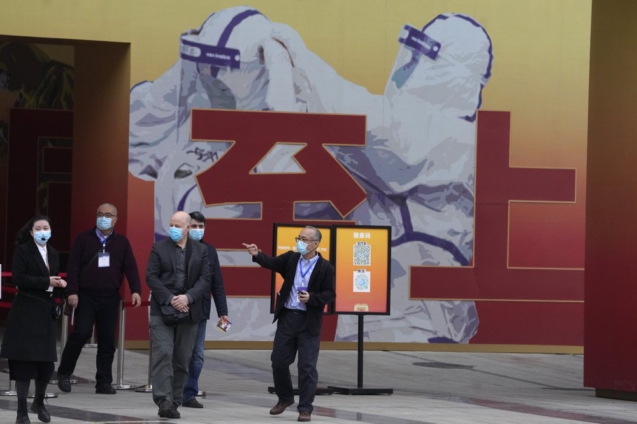Members of a World Health Organization team investigating the origins of the coronavirus pandemic visited another Wuhan hospital that had treated early COVID-19 patients on their second full day of work Saturday.
Wuhan Jinyintan Hospital was one of the first in the Chinese city to deal with patients in early 2020 suffering from a then-unknown virus and is a key part of the epidemiological history of the disease.
“Just back from visit at Jinyintan hospital, that specialised in infectious diseases and was designated for treatment of the first cases in Wuhan,” Dutch virologist Marion Koopmans said in a post on Twitter. “Stories quite similar to what I have heard from our ICU doctors.”
Zoologist Peter Daszak of the U.S. group EcoHealth Alliance, who is a member of the team, said in a tweet that the visit was an “important opportunity to talk directly” with medics who were fighting the virus at the critical time.
The team’s first face-to-face meetings with Chinese scientists took place on Friday, before the experts who specialize in animal health, virology, food safety and epidemiology visited another early site of the outbreak, the Hubei Integrated Chinese and Western Medicine Hospital.
The Geneva-based WHO said late Thursday on Twitter that its team plans to visit hospitals, markets like the Huanan Seafood Market that was linked to many of the first cases, the Wuhan Institute of Virology, and laboratories at facilities including the Wuhan Center for Disease Control.
“All hypotheses are on the table as the team follows the science in their work to understand the origins of the COVID19 virus,” WHO tweeted. It said the team had already requested “detailed underlying data” and planned to speak with early responders and some of the first patients.
The mission has become politically charged, as China seeks to avoid blame for alleged missteps in its early response to the outbreak.
A single visit by scientists is unlikely to confirm the virus’s origins. Pinning down an outbreak’s animal reservoir is typically an exhaustive endeavor that takes years of research including taking animal samples, genetic analysis and epidemiological studies.
One possibility is that a wildlife poacher might have passed the virus to traders who carried it to Wuhan. The Chinese government has promoted theories, with little evidence, that the outbreak might have started with imports of frozen seafood tainted with the virus, a notion roundly rejected by international scientists and agencies.
A possible focus for investigators is the Wuhan Institute of Virology. One of China’s top virus research labs, it built an archive of genetic information about bat coronaviruses after the 2003 outbreak of SARS, or severe acute respiratory syndrome.
The story has been updated to correct the spelling of Wuhan Jinyintan Hospital.
Soo reported from Hong Kong. Associated Press video journalist Sam McNeil in Beijing contributed to this report.
Latest Stories
-
Black Stars could miss key players for 2025 Unity Cup – Dr Randy Abbey
41 minutes -
Pyramids grab late equaliser in African Champions League final
2 hours -
EU calls for ‘respect’ after Trump threatens 50% tariffs
2 hours -
Ronaldo ‘could play’ in Club World Cup – Infantino
2 hours -
Amorim tells Garnacho he can leave Man Utd
2 hours -
Djokovic makes more history with 100th singles title
2 hours -
Ten Hag set to replace Alonso as Leverkusen manager
2 hours -
Salis’ Sunderland secure Premier League return
2 hours -
Assin Fosu chiefs and elders bless TGMA Unsung Artiste of The Year, Yaw Darling
3 hours -
Middle-aged, 2 children trapped in their home after a fig tree sealed their frontage doors
3 hours -
Roots of resistance: The climate cost of cutting Accra’s trees
4 hours -
Reimagining Informality: Harnessing the Urban potential of street vending in Ghana
4 hours -
Former Yendi MP Dr Farouk Mahama donates towards funeral of late Mion chief
4 hours -
Ghana Gas board pledges accountability and staff support during operational tour
5 hours -
Burkina Faso’s uprising is a rebirth, not rebellion – Ras Mubarak
5 hours

